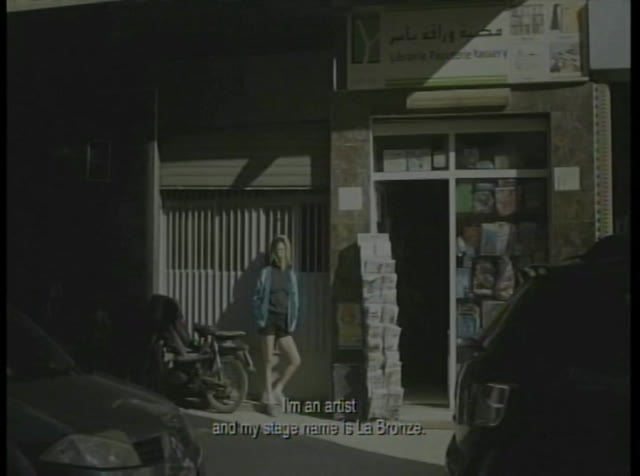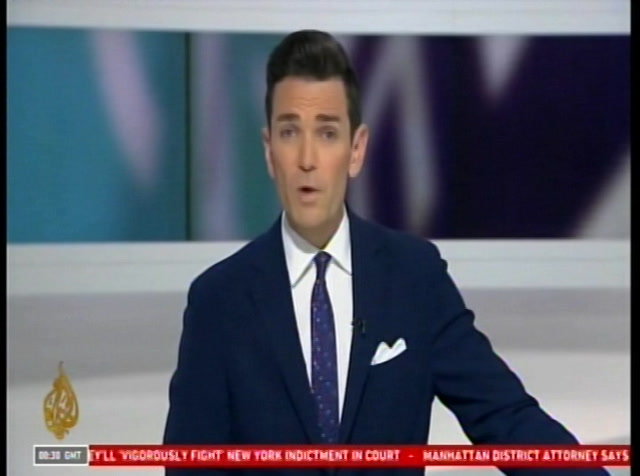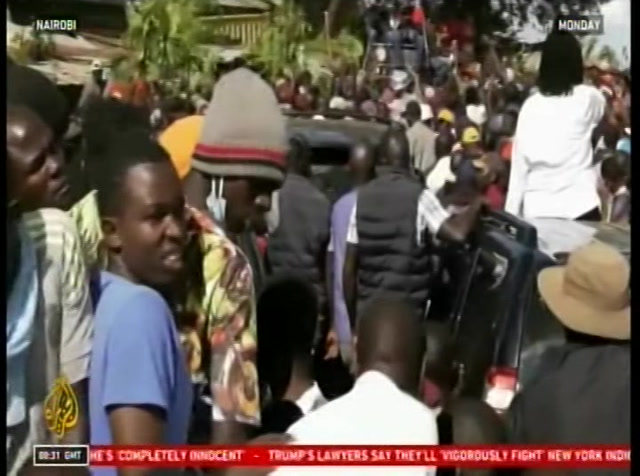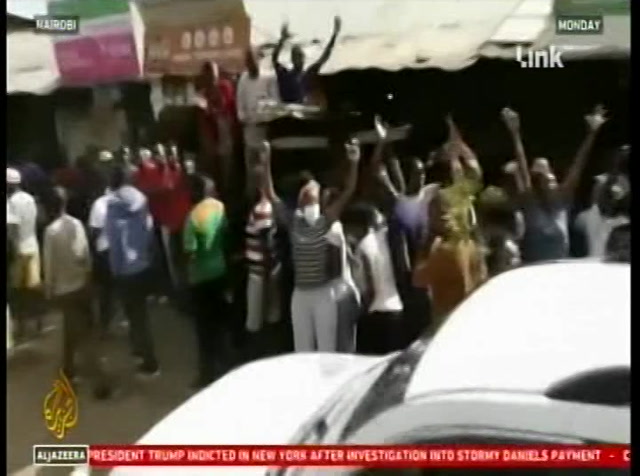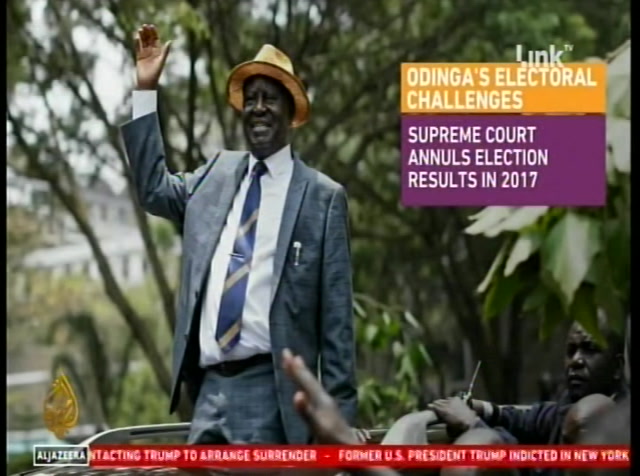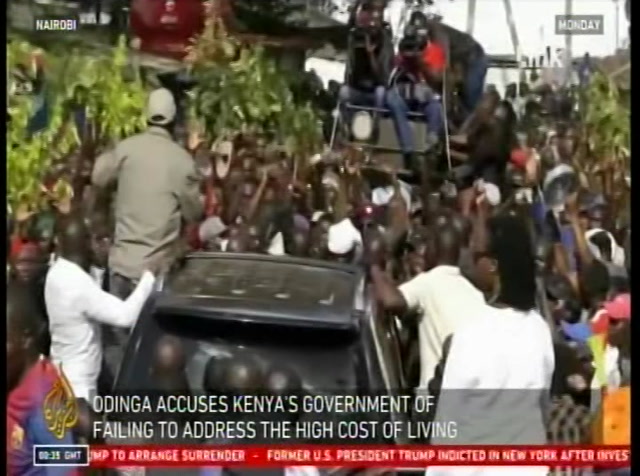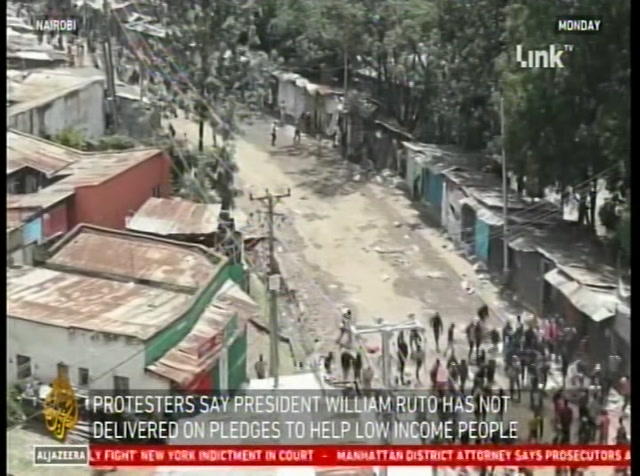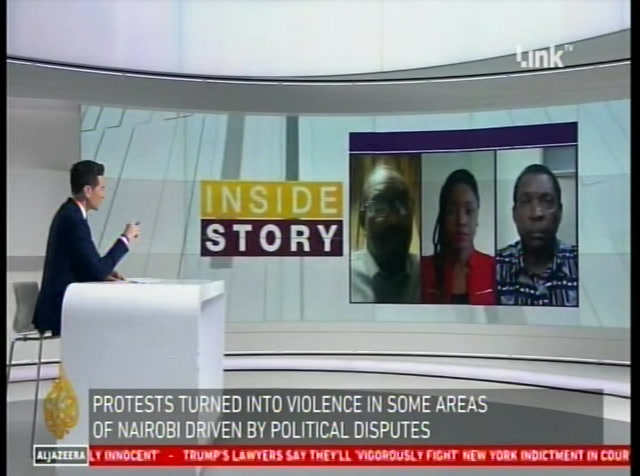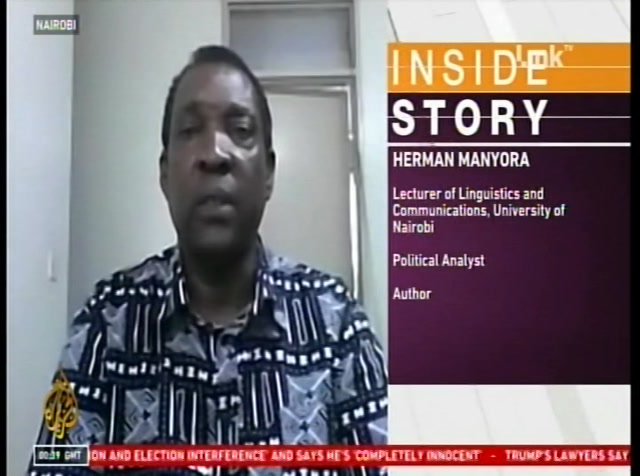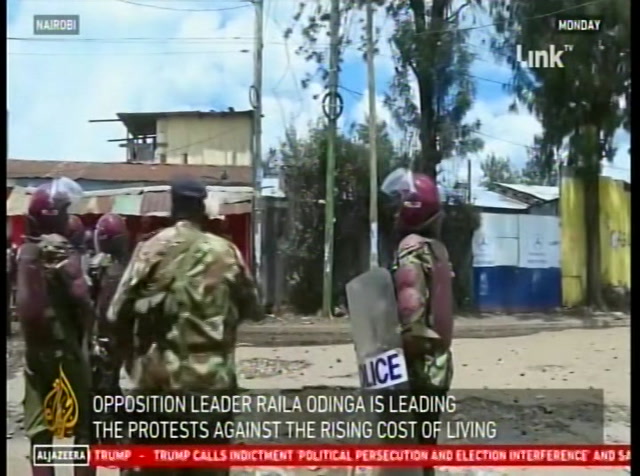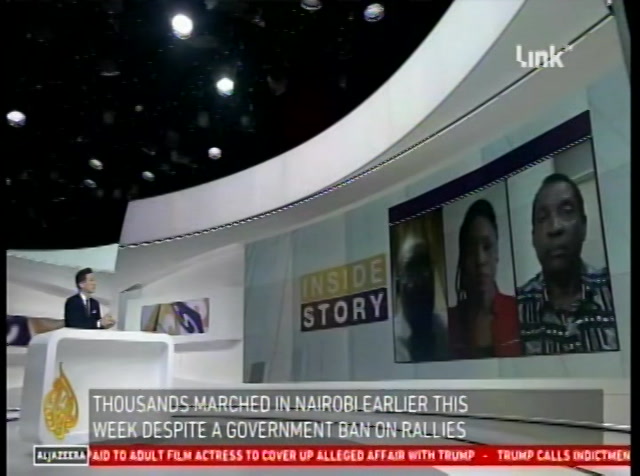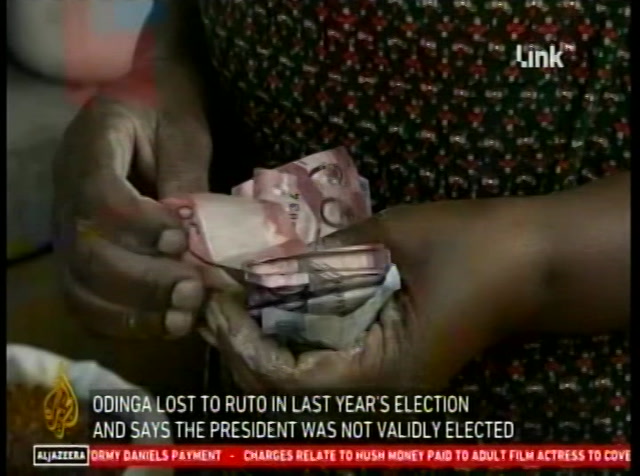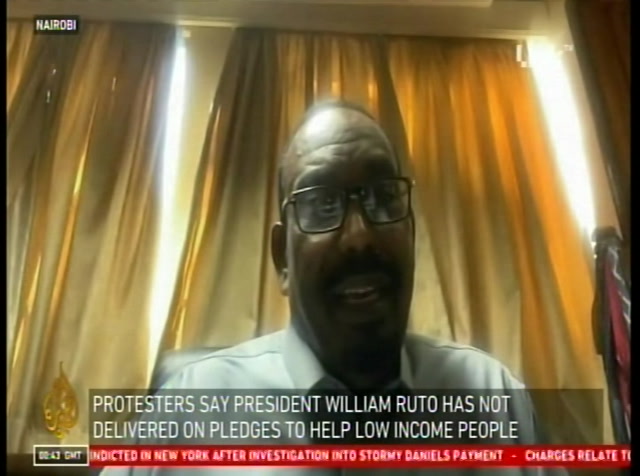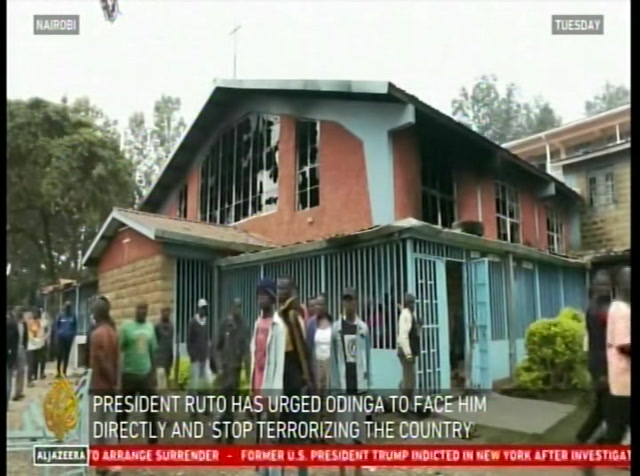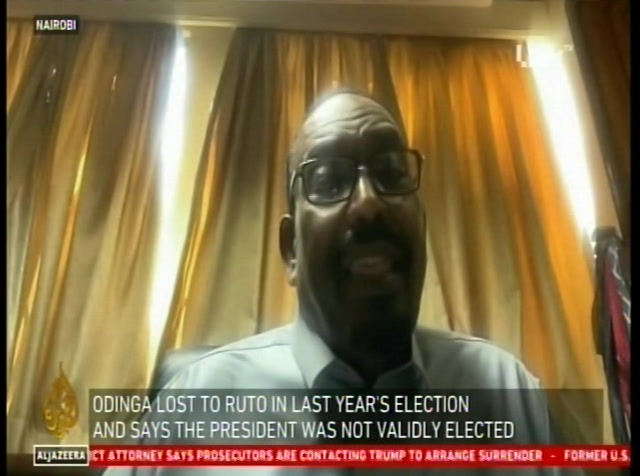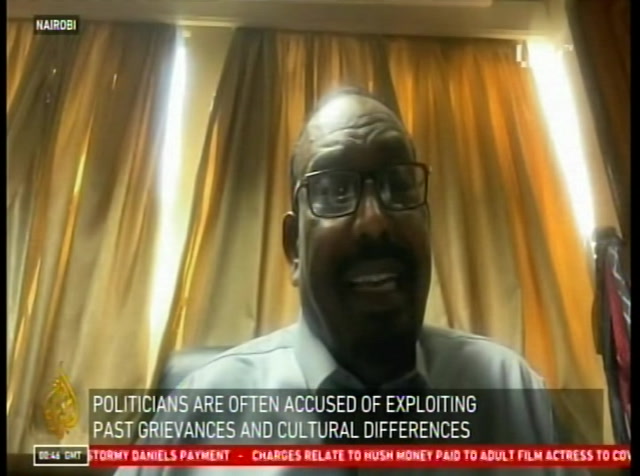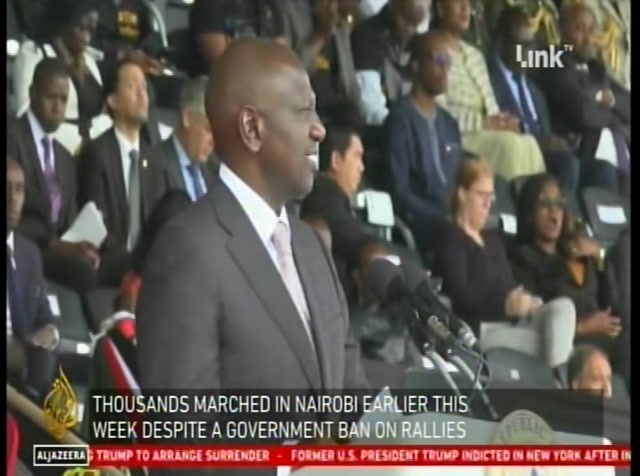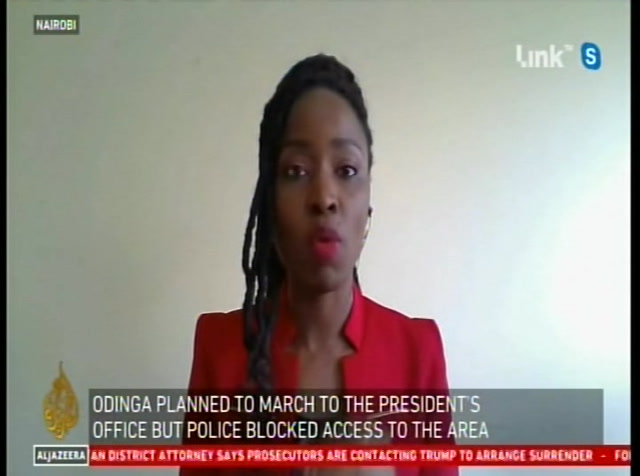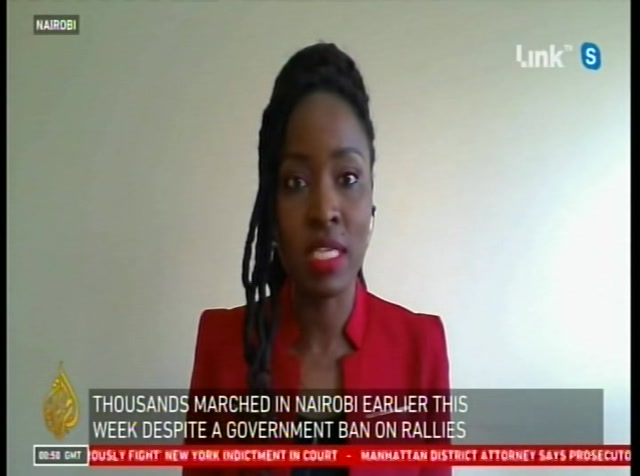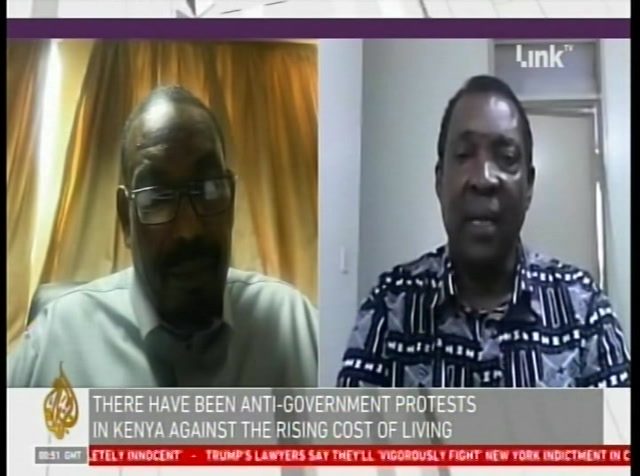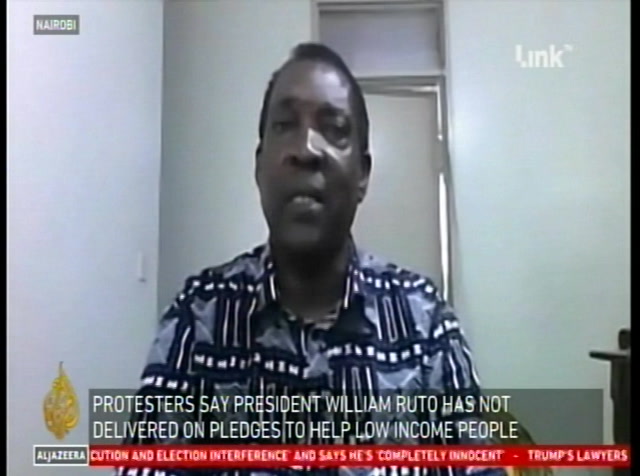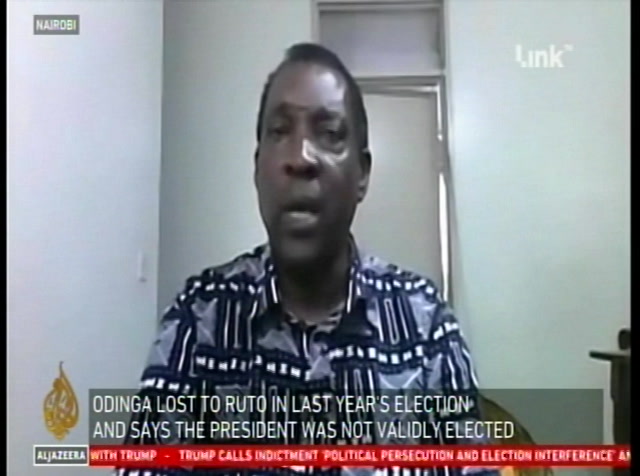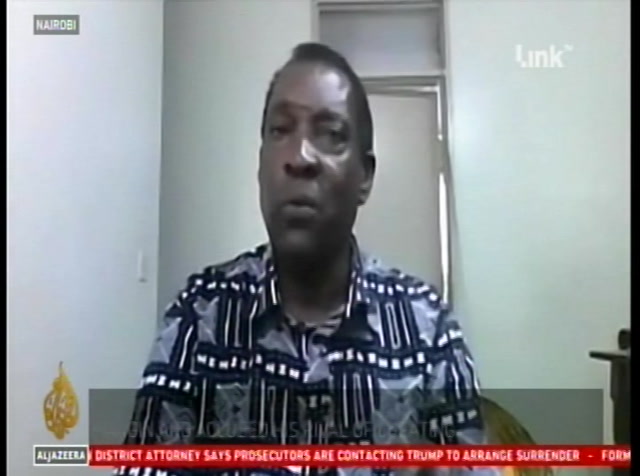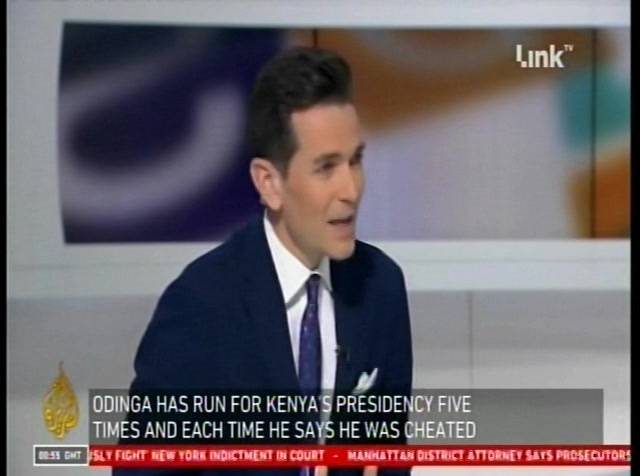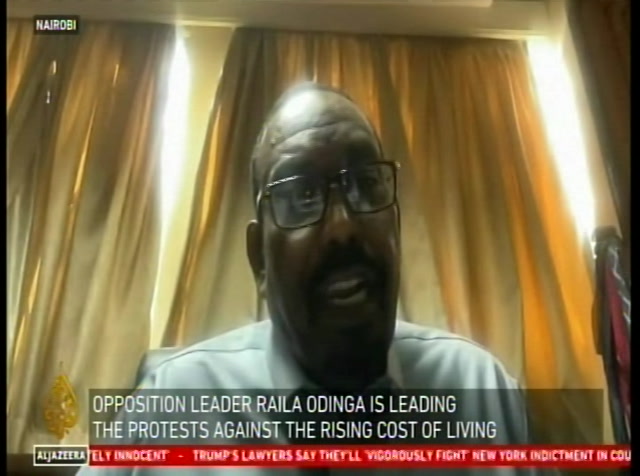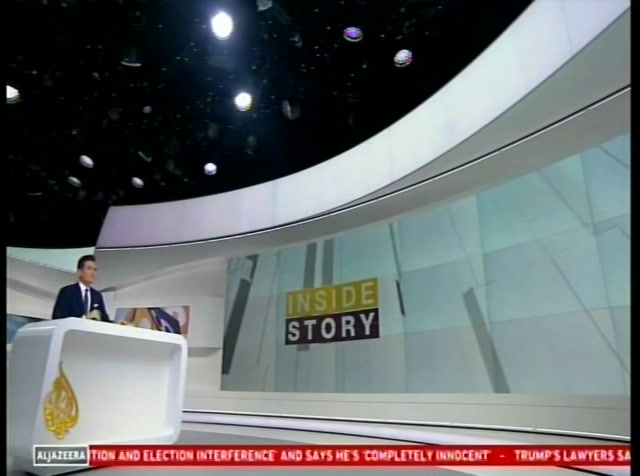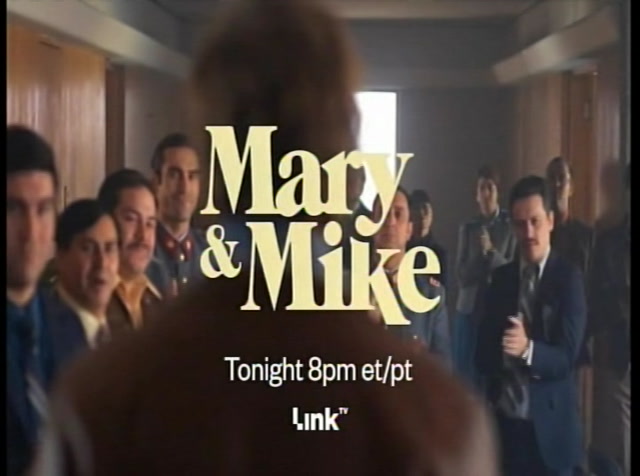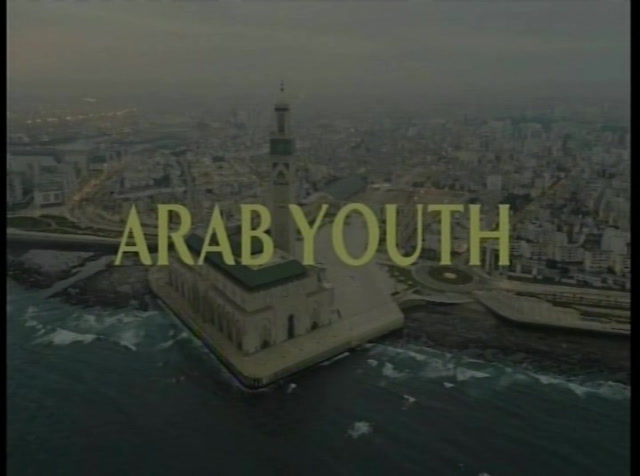tv France 24 LINKTV April 3, 2023 5:30am-6:00am PDT
5:30 am
cyril: what's driving the recent unrest in kenya? opposition leaders say they're protesting against the high cost of living. they also accuse the president of stealing the last election. so, can this be contained, or will it escalate? this is "inside story." ♪ hello, and welcome to the program. i'm cyril vanier. kenya has seen several days of protests and unrest, sparked by a rising cost of living and political divisions.
5:31 am
opposition leader raila odinga is leading the demonstrations while calling on his longtime rival, president william ruto, to resign. odinga lost last year's election by a small margin to ruto. he says he was cheated out of victory. we'll join our guests after this report from malcolm webb in nairobi. malcolm: people are demonstrating against the high cost of living. the prices of food and fuel have been rising, and the government of president william ruto has removed subsidies. it's opposition leader raila odinga who's called people to the streets. he's also disputing the results of last year's election. he's ran for president five times before and he's never been declared the winner. but in some of the past polls, there was substantial evidence that he'd been rigged out of victory. but last year, the evidence his coalition presented to the supreme court was not found compelling by the judges and they upheld the election result.
5:32 am
previous rounds of opposition protests in kenya have led to raila being offered deals or positions in government, but they've done little to alleviate poverty or to address the stark inequality or the grievances that underlie the reasons for people coming to the streets this time around. there repeatedly have been attacks on people and property by groups aligned to both the government and the opposition sides. on monday, businesses belonging to raila odinga and also to former president uhuru kenyatta, who backed raila in the last election, were attacked also in the kabira informal settlement here in nairobi, a church and a mosque were burned. there were also widespread reports of violence targeting journalists covering the protest by police, by protesters, and by armed gangs. religious leaders and rights groups are calling for calm. people are waiting to see if the tensions will escalate or if the
5:33 am
politicians will come to the table and make more deals. malcolm webb, for "inside story." cyril: last year's election results were very close, and raila odinga has rejected the results. the longtime opposition leader has run for office five times and says he was cheated each time. in 2017, the supreme court agreed with him and annulled the results. it said it found irregularities and ordered a rerun, but odinga withdrew from that rerun and at least 1,000 people were killed in the violence that followed the 2007 disputed elections.memn coalition, and the former deputy speaker of kenya's national assembly. thank you for joining us on the show. bina maseno is the executive director of badili africa, an
5:34 am
ngo which works to increase female participation in politics and governance. and herman manyora is a political analyst and professor at the university of nairobi, who voted for raila odinga. all of you are joining us from nairobi today. a warm welcome to each of you. farah, let's start with you. you're a part of the opposition coalition which is behind these protests, but i understand that you don't support people taking to the streets on this particular issue. explain to us why. >> well, i don't support people taking to the streets on this occasion. democracy, the basic, very fundamental rules of democracy is that when you go for elections and you lose an election, you allow whoever has won that election to begin running the government and doing the governance. these people have been in office now for hardly six months. i mean, about seven months, i think.
5:35 am
and usually it takes time for the government to organize itself. too many challenges here. in any case, it's not our business to now tell the same government, who defeated us in the last election, who went ahead and even defeated us in the parliamentary elections, because the speaker comes from their side, the deputy speaker comes from their side and then again we tell them that you've got to -- we went to court, the supreme court. we lost the matter in the court. we accepted the judgment or the ruling of the courts itself. we said, we're not happy with it, but we accept it and then we come back again and tell that same government, look, you won that election, not fairly, but -- and again you have to do a, b, c, d, you must work towards bringing down the cost of living in the country, you must take back, i don't know, the people who are the electoral commission before, so basically setting conditions for a government that's there and open the
5:36 am
server. i mean, these are not things that the government can do because the servers are under the control of an independent body called the iebc, the independent electoral and boundaries commission, so i think it's not fair. we just can't go out there into the streets because we lost the elections. we accept the defeat. we just have to give them an opportunity for them to start running the government and then we will begin taking stock and use whatever mistakes they make in these five years to inform kenyans and for us to win the next election. cyril: okay, there's a lot to unpack in everything you just said. so it's a good thing we have like 20 plus minutes to do that. bina, i take farah's point that you have to let government govern, but at the same time, the opposition is there to oppose the government. your take on what's happening right now in the streets of nairobi and kisumu and other parts of the country? >> i think, first of all, we have to acknowledge that some of
5:37 am
the issues being raised by the opposition during the protest are valid reasons, but then also understand that we have a political issue and we have an economic issue, and we have to see how to solve both of those issues. you know, we live in a country where we don't even trust the institutions that actually oversee election, and that forms the basis upon which people don't trust whether the elections were credible or not, even though the supreme court did give a ruling and say that they legitimize the election of president william ruto. so, as long as they haven't strengthened the institutions that oversee elections so that citizens can actually trust that elections were free, fair, and credible, we are still going to see most of these problems, even in the next election in 2027. about the cost of living, are we struggling with a high cost of living? we are. the median age in this country is 19-years-old.
5:38 am
we have so many young people who are jobless, right, and the bottom line is, even for citizens, we did elect our leaders to actually serve our needs. leaders who promised us that they are actually going to fulfill those promises when they are actually elected. so i think also citizens are fed up when they see a lot of politicking and less work being done. and if at all work is being done behind the scenes, can that be explained to the public in such a way that we were supposed to have achieved this let's say in the first six months, but we are not able to achieve this because of these very reasons. so give us time to achieve a, b, c. cyril: herman, we heard from both farah and bina that there are really two issues at play here that are driving these protests. one is the high cost of living. and there's just no denying that the price of petrol has gone up, the price of maize, which is essential for staple food has gone up.
5:39 am
but another issue here is the political rivalry between odinga, who narrowly lost the election to ruto, and the president. do you think that these protests in your view are legitimate? do you think these two issues should be separated? >> i think there's no way you could separate them, because they are so related. and in terms of mobilizing on the part of the opposition, the efforts would be much less effective if the issue of cost of living wasn't part of the bill. so, yes, the citizens are unhappy with the cost of living, but also, a significant part of the citizens of this country are also unhappy with the election results. so these two work together. and when the opposition is mobilizing, they are actually talking about the political issue of the legitimacy of the
5:40 am
president, and at the same time using the cost of living as i'm -- as a mobilizing weapon. you cannot separate them up. cyril: okay, well, as far as the cost of living is concerned, then do you hear pharah's argument that the government and this president need time to turn things around? >> well, it's possible you could need a year or even two. but in circumstances where people could be dead by the time you're asking that this is over, you will have to move in fast. -- to be moving fast. you realize according to a number of kenyans, one of the reasons why the cost of living is high, especially in matters of food and fuel and electricity, are i think for fuel and food subsidies that would have cushioned or poorer kenyans who are removed. and many people have this feeling that diseases are pushed that is making the government do that. so there are certain things you
5:41 am
can't wait for. you can wait for long term measures to take place. but if people are dying, and i can assure you, life in this country is unbearable. some don't want to live in this country. there's only so much government can do. there's so much corruption, you don't have to wait to deal with corruption and theft. so there is a lot the government can do. and even a lot more beyond the government's control because of international issues. but yes, there are things that cannot wait. cyril: so, farah maalim, do you support the austerity measures that were put in place by this president and his government in order to secure that imf loan knowing that the same austerity measures have either driven up the cost of living or kept the
5:42 am
cost of living high for ordinary kenyans? >> the cost of living did not become high on the assumption of office of this current government. the cost of living was high even before them. as a matter of fact, in this case of the stable food, the maize mill, the maize mill was more expensive that time. so it's over 200. well over 200, now about 200, maybe less in some cases. but let me tell you one thing. we were part of a kind of informal coalition through something called the handshake. when the former president and the coalition leader, we basically got together. for the bulk of the last time, the five years of that term, and at least in the very least about four years of that, the current president was not in the mainstream.
5:43 am
it was basically somebody was hunted -- this election was for us to lose and we lost it nonetheless. because even towards as we are getting closer to the elections, all the predictions, all the opinion polls did indicate that this was a very close, close election, and we're too close to call, and indeed it was too close to call because they won with a very small margin to avoid the second round. now, for us to begin telling them that we're going to -- people are going to die before a year ends and for the four years before that, the current president was nowhere near power. the power was basically concentrated and the former president and our own leader whom we hope to make the president, i think to say the least is very unfair and it's extremely dishonest. and in any case, when you go to the -- even without the subsidies, the fuel prices are more or less the same as what they were then.
5:44 am
so basically, we have also kind of a catch 22. this country is broke. these people took over a broke and broken system. there was no money. there were no reserves. there was nothing. basically everybody believes things were abused, the subsidies were abused, and billions of kenyan shillings were stolen through that. we need to have a forensic audit of all that to find out exactly where that money went. but it's only fair for us to give a little bit of time and in the very least a year to this government for them to begin now correcting the things. and they have started correcting some things. so i think for us to come out into the open -- it is not as spontaneous demonstration that is being done by kenyans who are unable to bear the cost of living. no, it is one that is called for by our own collision bosses. the leader, raila odinga is the one who called for these demonstrations. cyril: if i can just jump in
5:45 am
here, should you still be a member of the opposition coalition? should you be in a coalition with raila odinga, given that so far you have been critical of the positions he's taken and you've been rather supportive at least in this program of the government and you're in favor of giving them a grace period? should you really still be politically in a coalition with raila odinga? >> can i explain to you one thing? in my constituency, i put in more efforts and more resources to get all the votes for raila. as a matter of fact, raila odinga had about 23,000 votes in my constituency the last election, while ruto had only 508. most of them are not the own people. there this was the government workers were there. so we did everything we could have done. we were there on our own volition. i have been in the opposition myself for the longest, and out of a principle, but the country is -- my loyalty is more so to the country than to an individual. it has to be told, a principle,
5:46 am
an ideology, or to the nation itself, not to an individual who is going to tell you wake up one in this direction, one in the opposite direction, and more often than not to achieve anything for the country and the people of the country. because raila was the one who was defending the high cost of living just before the elections. and it's very recorded. and then he suddenly comes out now and says the cost of living is expensive, i'm calling for a mass action. it doesn't happen like that. when the cost of living is is high, it becomes spontaneous. it's the masters who are unable to deal with that cost of living and come out into the streets. this is different. this is a political demonstration. they can say that you promise to bring down the cost of living and you haven't brought it down. but who took it that high up there? it is uhuru. and raila was very close to him courtesy of their relationship at that time. so dishonesty in my opinion --
5:47 am
my loyalty is to my country. i am not in kk or what they call the coalition now. i am still in my coalition . i'm taking it to a different level altogether. you are creating a situation. we have had similar situations before with mass actions. cyril: i will let you speak again, sir, but thank you so much. and by the way, just for viewers who are less familiar with kenyan politics, when you say uhuru is responsible for the high cost of living, you mean of course the former kenyan president, uhuru kenyatta. bina, herman, i saw some raised eyebrows. i saw some smiles. let me let me go to you, bina. do you feel that the government deserves to be given more time to tackle cost of living issues? is it unfair for the opposition to try and put so much pressure on them now in the streets when they've been in power for, what, just over six months? >> you know, first of all, if at
5:48 am
all actually, this was a very credible election, and we go by the president winning this election. he is rightfully so saying the cost of living did not begin with this regime. also i think the reason we perhaps vote for new leaders is so that they can actually bring about that new change that we envision. it's because they promise if you elect me, i am going to do x, y, z. so we are saying, yes, the government is broke, but then at the same time, while we think the government is broke, people are seeing a bloated government, you see people are complaining, citizens are complaining because we are saying we inherited coffers that are actually empty. we just appointed 50 chief administrative offices. -- administrative officers. that is double the number of the officers we had in the last regime.
5:49 am
in the last regime, we had about 23. and this is an office that is unconstitutional already. and if you look at also the individuals that we have actually appointed, they are not the struggling everyday ordinary kenyans, they are not the struggling young people, the struggling hustlers that we actually said we want to represent when we are elected. that's a confusing message, when we say we are actually very broke, and then you come and also expand your government. and we don't even have resources that can actually be channeled to the basic needs that citizens are actually talking about. right? there's research i read that shows, actually this was i think a month ago, if not two months ago, that kenyans spend 46% of their income, yes, whether in business or formal employment, 46% of their income goes directly to food. so how much are you left with to actually spread across the other basic needs -- whether it's education, whether it's shelter, whether it's your own personal
5:50 am
needs? how much are you left with? that's what we are talking about. kenyans who are being employed who necessarily are not even struggling kenyans when we have the majority of the people who are jobless in this country. we have about a million people who graduate from institutions of higher learning, tertiary education every other year to a job market that can only accommodate 50,000 people. so where do the rest go? the majority of the citizens are also employed in the informal economy. how are we investing in the informal economy? how are we regulating the informal economy given that that is the same industry that accommodates the majority of the women and the young people in this country who are the most vulnerable when it comes to us struggling economy? so i think at the end of the day, it is also for the president to understand that he now is the president for every other person, not just the people who supported him. so even with some of the polarizing remaps that we hear -- remarks that we hear in this
5:51 am
country, that all this government is for the shareholders, we are all supposed to be shareholders. we are all shareholders. you are serving every other person in this particular country. you are supposed to be a symbol of national unity. and right now is the most important time to see, how do you actually promote diversity at such a time like this, when some people feel excluded? and it's not the first time people are feeling excluded. because if we don't handle these matters correctly right now, they're going to spill over to the next election and to the next election. cyril: well, that's undeniable. especially when you factor in that raila odinga has run for office -- for the presidential office five times in a row, lost five times in a row, contested the results multiple times. yes, there is a chance that some of this spills over into the next election. i think that's fair. herman manyora, you were raising your eyebrows earlier. what did you want to say? >> i was listening to my friend.
5:52 am
farah, a very good friend of mine. and he sounded like a government apologist. first of all, raila odinga was not part of the past government. he was perhaps friends with uhuru kenyatta, the former president, and they had engaged in a kind of ceasefire. but he wasn't part of government. with that as it may, it is also true, like the good lady says, when you want to run government, you know the problems you are going to face. people can give you time, if there are indicators that tomorrow will be a better day. if you become president and the sort of team you put up, the government you put together
5:53 am
the sentence by our -- you put together doesn't inspire confidence, you'll be stretching imagination too far to expect the citizens of that country to give that can that government a chance to better things tomorrow. secondly, the people can also bear, we the government understand that these are hard times and give the government time to put things together, but if that government is engaged in excesses, in extravagance, setting aside of $7 million u.s. dollars to buy cars for three individuals, excess appointment of unconstitutional officers in excessive travel. -- and excessive travel. in travel of government officers who have bloated delegations in running down the country in homecomings and all sort of things we are government resources are spent.
5:54 am
you'll be expecting too much from the citizens of that country if you ask them to give that particular government time. yes, government can be given time, and indeed it should be given time, but there must be indicators on the ground that that time will be utilized in a way that we can believe will yield fruit. but what is on the ground doesn't inspire any confidence at all. but again, what i said, and this is very, very important, if the citizens of your country are dying and you are in charge and you are listening to a third party who tells you, do not put certain measures in place or put taxation measures in place, when you know they'll break the backs of your people, if you listen to an institution like the imf telling you, no subsidies, and yet you know very well your people are going to die, surely that cannot be acceptable, not in the 21st century. so the president of our country must make it his responsibility to ensure the people of this
5:55 am
country at least survive and live just to survive. and therefore these kinds of things cannot wait. because if we wait, we are waiting for disaster. you can see the numbers in the streets today with raila odinga. those numbers are not there because they necessarily believe in this issue of a stalling election. -- a stolen election. the numbers are mainly there because of the challenges, economic challenges, the problem of food, of transport. cyril: herman, i want to jump in, because we have just two minutes left, and i am sorry to interrupt you. respectfully, i want to ask all of you, does there need to be a handshake moment? so, for background, what's known as the handshake moment in kenyan politics is when odinga stunned kenyans, raila odinga stunned kenyans after being bitterly opposed to then president uhuru kenyatta by turning around shaking his hand. and they had some form of informal coalition. and i couldn't call it co-governance, but they came to
5:56 am
an agreement after being bitterly opposed. farah maalim, you first. does there need to be a handshake moment? we only have a few a few moments left. i'll ask you to keep it short. >> yeah, to begin with, the chief administrative secretary he has now appointed was not something that started now. it was a precedent. they were initially appointed by uhuru kenyatta when he was the head of state. and not now, but 10 years back. the numbers, yes, you could debate the numbers. the second thing is -- cyril: i need an answer, sir, does there need to be a handshake moment? >> no, there's no need to be a handshake. if we are going to appreciate what is called democracy, then we appreciate democracy within its confines, and the way it is practice, all of us -- practice,
5:57 am
all of us, not the democracy after elections and negotiations. the power elite and the opposition guy must not, get into another agreement that only serves their interests. we have seen this many times before. cyril: all right. >> we don't have enough time, but i could have talked about it for days on end. and they then massaged one another's ego and agree nothing -- corruption does not end. that is just the two of them were going to sit somewhere and have a banquet to share between themselves. i don't like that myself. i've seen many of it before. cyril: okay, i'm afraid we're gonna have to leave it there. farah maalim, bina maseno, and herman manyora. thank you so much for joining us and joining this panel today on al jazeera. and thank you, too, for watching. you can see the program again anytime by visiting our website, aljazeera.com. and for further discussion, go to our facebook page, that's facebook.com/aj inside story. -- facebook.com/ajinsidestory. you can also join the conversation on twitter or
5:58 am
25 Views
IN COLLECTIONS
LinkTV Television Archive
Television Archive  Television Archive News Search Service
Television Archive News Search Service 
Uploaded by TV Archive on

 Live Music Archive
Live Music Archive Librivox Free Audio
Librivox Free Audio Metropolitan Museum
Metropolitan Museum Cleveland Museum of Art
Cleveland Museum of Art Internet Arcade
Internet Arcade Console Living Room
Console Living Room Books to Borrow
Books to Borrow Open Library
Open Library TV News
TV News Understanding 9/11
Understanding 9/11